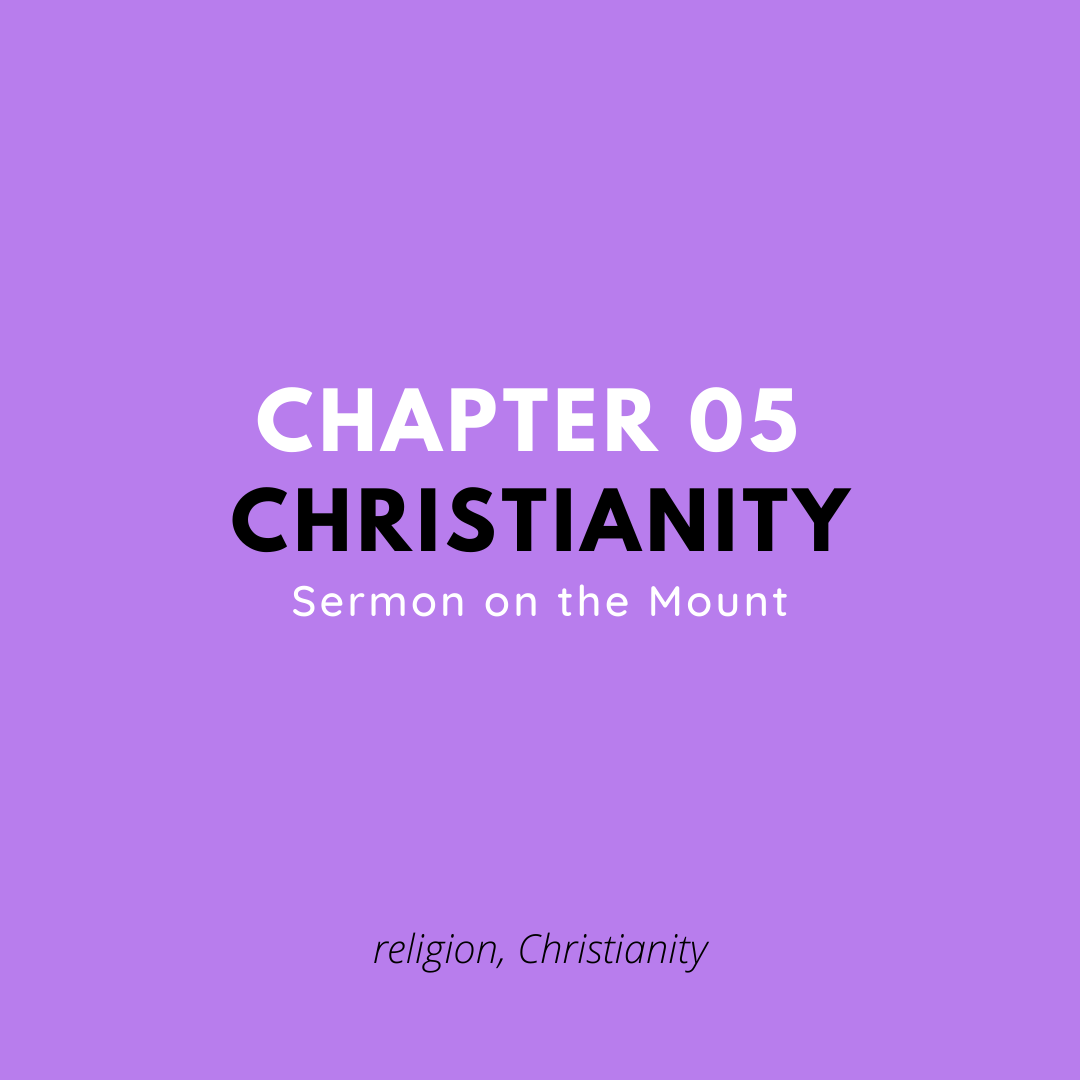Christianity Ch. 05 : "Sermon on the Mount"
a very long synopsis of Christianity
John was unequivocal that the Messiah was not only coming, but coming soon. The hour of deliverance for Jews was to happen imminently.
Jesus was deeply affected by John’s prophecies. He headed for the desert, alone, to meditate and pray about the Messiah and what it mean.
Amnesty International considers solitary confinement to be a type of inhumane treatment because of its severe psychological and emotional impact on a person. To be alone and without human contact can be rejuvenating and healthy, for certain amounts of time. There are monks and hermits and people throughout history who have benefited from long periods with little or no other human contact. But in general...imagine the idea of 40 days alone. In the desert. And what it would do to your mind, let alone body.
For 40 days and nights he remained in the desert. Alone.
When he returned, his thoughts and words began to focus increasingly on the idea of a brotherhood of man and a world of peace and justice - not just for Jews, but for all. He pondered these ideas as he prepared to journey to Jerusalem’s holy feast.
Historians estimate 300,000 - 400,000 pilgrims came to Jerusalem every year for Passover.
When he arrived in the courtyard, a scene of outrage awaited him. Oxen. Sheep. Doves. Livestock and merchants and money changers and traders. A place of commerce filled with tables and coins and noise and haggling as dealers negotiated with pilgrims arriving for the feast.
This was the Temple; the House of God. The inner courtyard of a most holy place.
Jesus grabbed hold of a whip and began driving the cattle out. He overturned the tables holding money. He spoke loud over the voices of all the tumult.
“Take these things away; do not make my Father's house a house of trade." - John 2:13-16
In Matthew 21:12-13 he says,
“My house shall be called the house of prayer; but ye have made it a den of thieves."
Think about this on multiple levels. This is possibly the most extreme recorded example of Jesus exhibiting one of the most fundamental human emotions: anger. So often anger is dismissed as unhealthy or immoral or misplaced, or most frequently as something to get rid of and move on from. But Jesus isn’t disguising his anger here. He’s not turning it into a positive learning experience for everyone.
He is responding viscerally and immediately to a scene that he views as wrong and a betrayal of God. He’s not slowly going through appropriate channels to change things. He’s not asking permission. He’s not asking, period. He’s moving beyond words into action and thunderously, authoritatively telling all present that,
No! This is hypocritical and wrong!
And with those words, he is taking action.
Action. That’s what truly starts the downfall of his standing with the religious community. He has threatened the authority of the priests and religious leaders, because the commerce would not have taken place without their blessing and support. He has challenged their authority. Publicly.
He is a threat.
“You will never be liked by everyone,” I told my children recently. “And that’s okay. Be yourself, be kind, be curious, compromise on what’s little and stand your ground on what’s important. But do not be concerned with how many people like you, because no matter what you do or who you are, there will be those who like you. And some who may not.”
Jesus gained many followers after this. He also gained many enemies. That’s the way it works with the innovators and earth-changers: their radicalized message or idea is so different and powerful that it will appeal to some, and by definition, be repugnant to others.
Anything new is threatening to those in power.
What Jesus brought was a new way of thinking about the Law. So if you’re the self-appointed authorities of interpreting and upholding the Law, are you going to be happy about a new guy coming to town and admonishing you for not upholding it well and for desecrating the Temple?
Jesus returns to Galilee and continues to preach in Nazareth and Cana. Many listen to him, some dismiss him, and some question where his authority and wisdom come from: Isn’t he a carpenter’s son? What makes him so wise? Jesus said:
“A prophet is not without honor, save in his own country and in his own house.”
He doesn’t leave his country, but he does leave his house and heads to Capernaum, a small village on the beautiful shores of Lake Galilee. He moves in with a pair of brothers, Peter and Andrew, where he frequently preaches to the fishermen while they fix their nets.
People talk. Fishermen talk. Word of his teachings spread to nearby villages and towns and then beyond. Tales are told that begin reaching all over the kingdom. People start to visit the village to meet the man in person.
One of his greatest sermons was near the hills of Capernaum. We know it now as The Sermon on the Mount. It contains many of his most important teachings and features many sharp contrasts from priests and rabbis who had come before him.
The Beatitudes focus on kindness, humility, and compassion as spiritual ideals, rather than force and authority. Many of the ideas are not necessarily new ones or different from the Old Testament, but they offer a new context and prioritization that focuses on mercy, love, purity of heart, salvation through grace, and the importance of not judging others. It is not a denunciation of Old Testament Law as given to Moses, but a re-prioritizing and re-thinking about what is most important in God’s Kingdom.
“I have not come to destroy the law, or the prophets: I am not come to destroy but to fulfill.”
HIGHLIGHTS OF THE SERMON ON THE MOUNT
The Blesseds
Blessed are the poor in spirit, for theirs is the Kingdom of Heaven.
Blessed are the meek, for they shall inherit the earth.
Blessed are the they which do hunger and thirst after righteousness, for they shall be filled.
Blessed are the merciful, for they shall obtain mercy.
Blessed are the pure in heart, for they shall see God.
Blessed are the peacemakers, for they shall be called the children of God.
This did not jive well with many in power. If you have wealth and authority, then you should be at the front of the line and ready to enter a kingdom first. But Jesus is saying that those at the bottom of the food chain are those who are blessed by God. He’s saying that to be merciful and to make peace is a good thing. Mindblowing.
More on peace
If your enemy hits you on one cheek...turn the other cheek and let him hit that one.
Love your enemies. Bless them that curse you. Do good to them that hate you. Pray for them that spitefully use you and persecute you. God will handle judgment on the just and the unjust.
Again, mindblowing. Remember that Jews were under the thumb of the Romans. For almost a thousand years they’ve been oppressed by the Assyrians, the Babylonians, the Persians, the Greeks, and the Romans. Waiting for a messiah to deliver them. And now some radical is telling them to stop fighting and to love - not just tolerate, but love - their enemies?
Forgiveness
If you want God to forgive you, then forgive others.
If you don’t want to be judged, then don’t judge.
Do to other people what you would like them to do to you.
This last statement ties together a large portion of his message about how people should treat each other.
The Golden Rule.
Treat others like you would like to be treated.
___
In summary, the big difference between was Jesus was teaching and the teachings of Judaism was this:
Judaism taught about the Law.
Jesus taught about Love.
The Sermon on the Mount contains many of the most important ideas Jesus taught for living an ethical Christian life.
REMEMBER:
Capernaum, Galilee, Peter, Andrew, Sermon on the Mount, Beatitudes, Golden Rule, forgiveness, judgment, love, enemies














